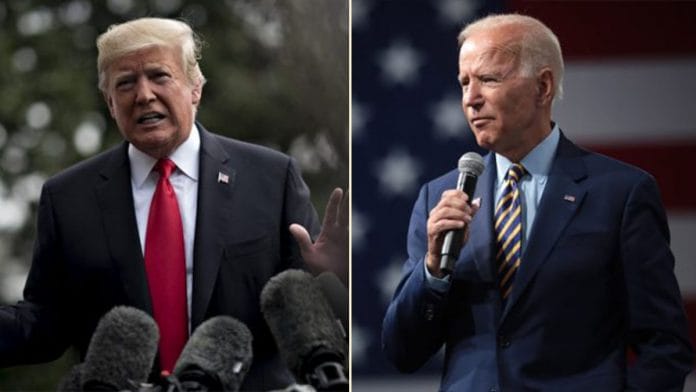New Delhi: US President Donald Trump and Democratic presidential candidate Joe Biden are all set to face off in the first presidential debate Tuesday night (6 am IST Wednesday) in Cleveland, Ohio.
This is the first of three scheduled debates between the two presidential hopefuls ahead of the voting on 3 November. The other two will be on 15 October in Miami, Florida and 22 October in Nashville, Tennessee.
Traditionally, the 90-minute debates give voters a chance to assess candidates’ stance on various issues and their ability to answer on-the-spot questions in front of a live audience.
However, what is usually a dramatic affair with a massive live audience will now be much more subdued this time due to the Covid-19 pandemic.
The audience to be hosted by the Cleveland Clinic and Case Western Reserve University is expected to be much more sparse in compliance with the Covid regulations.
ThePrint looks at how the pandemic will shape this year’s debate.
Also read: How tough will ‘President Biden’ be on China? His debate tomorrow with Trump will tell
Smaller audience, lesser energy
According to a CNN report, 60-80 people in the live audience are expected this year, much lower than earlier, and all will be tested for Covid-19 before they are allowed to attend the debate.
“There’s usually a thousand plus in the hall,” Mitchell S. McKinney, associate professor at the Department of Communication at the University of Missouri, said at a virtual press briefing Monday.
The podiums for Biden and Trump will also be further apart, though neither will wear masks. Debate moderator and Fox News TV host Chris Wallace will also not be seen masked up. Wallace, a veteran journalist and anchor of popular ‘Fox News Sunday’ show, gained prominence after he fact-checked Trump over the Covid mortality rate in the US. Trump claimed Thursday Wallace was “controlled by radical left”.
The long-standing tradition of candidates shaking hands before the debate will also not take place, not even the elbow-bump that has become popular amid the pandemic.
They will also not be giving any opening statements, and the first question will be posed to Trump. The 90-minute debate has been divided into six segments of 15 minutes each. The topics up for debate are Covid-19, the Supreme Court, economy, racial violence, integrity of elections and records of the two candidates.
While a smaller audience may impact the energy in the room, many argue that it will limit sensationalism of the debate.
There was no live audience at the Democratic presidential primary debate between Biden and Senator Bernie Sanders in March this year, and a New York Times report noted: “..there were no jeers or cheers disrupting the proceedings, no playing to the crowd by the two men onstage…Moderators had the grace and good sense to stay silent when the candidates questioned each other directly.”
Also read: Trump-Biden presidential debates more than just politics — key moments from the past events
Biden and Trump debate performances
The audience is also expected to impact the debating styles of Biden and Trump, according to experts.
One of these candidates tends to desire more crowd energy, adulation and enthusiasm, and the other is more low-key, said McKinney.
Based on previous debates in 2015 and 2016, Trump was observed to seize the spotlight, highlight his stances on key issues and interrupt his opponents with claims and accusations, which if false were difficult to refute in real time.
For example, in a 2016 debate, he accused Democratic opponent Hillary Clinton of flip-flopping on the Trans-Pacific Partnership during her time as Secretary of State and continually interrupted her while she debated her stance.
McKinney also pointed out that Trump has ushered in a new form of debating that involves “name-calling” and verbal attacks.
Biden, however, is “a classic Senate orator” who speaks slowly, is softer and relies on personal anecdotes to convey his stances on key issues.
During Democratic primary debates earlier this year, he had been criticised for appearing less energetic.
This led the Trump campaign to raise doubts about Biden’s mental fitness and even demanded he take a drug test before the debate to ensure he was not consuming performance-enhancing medication.
The Biden campaign has since responded by saying, “Vice-President Biden intends to deliver his debate answers in words.”
Also read: Why Biden has the upper hand over Trump in expectations game for tomorrow’s debate






